Your car is heating up, and you’re left wondering the reasons for car overheating.
Who wouldn’t be frustrated and terrified if they saw smoke rising from underneath the hood while out for a summer drive? There can be many reasons for car overheating, and the damage inflicted by it can be permanent if the precautionary measures are not taken at the right time.
However, there are many reasons for car overheating other than the outside temperature that can make a significant contribution to your car’s threat of overheating, and most of them are avoidable if you know what to look for.
Keep a keen eye on the engine light as well as give your car a thorough inspection before embarking on a summer road trip. You don’t want to be stranded on the roadside with your engine erupting in flames.
In this article, we will discuss some of the common reasons for car overheating, car overheating when idle, how to fix overheating car, and some of the tips to avoid car overheating.
Contents
Reasons For Car Overheating
The following are some of the reasons for car overheating:
Too Little Or No Coolant
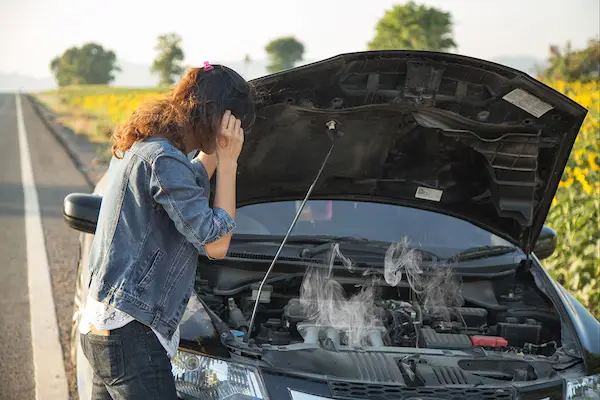
It is one of the major reasons for car overheating. The cooling system removes most of the extra heat, and the coolant does the bulk of the work.
It soaks up heat from the engine and then continues to move to the radiator to cool off. It returns to the engine after it has departed its heat. As a result, if one cooling system lacks sufficient coolant, it will be unable to function properly.
As a result, the temperature of the engine will rise. We suggest checking the coolant levels regularly because it’s simple to perform while inspecting your lubricant or oil or restocking the wiper liquid. If you’re starting to lose the coolant system due to leaks, you should have it inspected so that technicians can find the location of the leak.
Faulty Thermostat
One of several major reasons for car overheating is a thermostat malfunction. The thermostat controls the coolant flow. The thermostat valve stays closed even before your engine initially starts, attempting to prevent coolant from circulating.
The valve opens when the engine achieves thermal performance, enabling coolant to keep flowing through the engine. A defective thermostat may remain closed while the engine is hot, resulting in overheating.
Fault In The Water Pump
The water pump is in charge of moving coolant across the whole cooling system. It got this name since coolant used to be just water. Coolant is now a combination of antifreeze and water, but the original name has stuck.
If the water pump screws up, coolant may not flow as well or may completely stop, resulting in an overheated engine if the coolant thresholds are sufficient.
Damage To The Radiator Or Its Cap
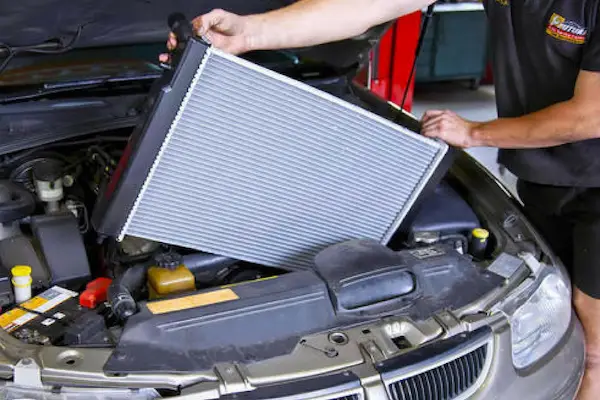
The radiator would be where the coolant ends up going to “lose its coolness.” The coolant circulates through the radiator’s tubes.
The heat from the liquid is accumulated by strong bonds to all these tubes, and it is removed by air having passed over the radiator. It is less effective if the radiator has already been badly damaged in an accident.
Besides that, the cap of the radiator is intended to maintain the pressure in your cooling system. If the cap is compromised, the cooling system may simply heat up and escape instead of being properly cooled.
Low Engine Oil Levels
Apart from the lubrication of engine parts, the oil in the vehicle helps to control temperature. It also serves as one of the reasons for car overheating; low levels of oil may increase the engine’s temperature.
Damage To Radiator Fan
We discussed how the air passing over the radiator helps to dissipate the heat absorbed by the blades from the coolant, but this only happens when the car is moving.
As a result, when your vehicle comes to a complete stop, the radiator fan will turn on. The radiator is circulated by this fan. If it is broken, your vehicle may start to overheat while idle before cooling down once you start to drive.
Blown Head Gasket
The blown head gasket is one of the essential reasons for the car overheating. Your vehicle’s head gasket keeps the engine block and cylinder head separate.
If it explodes, coolant and oil may enter the combustor and the cooling system. This can result in a noticeable coolant leak, but it can also result in lower coolant thresholds without a noticeable leak. In addition, you may observe milky-white oil as well as white smoke rising from the exhaust pipe.
Car Overheating When Idle
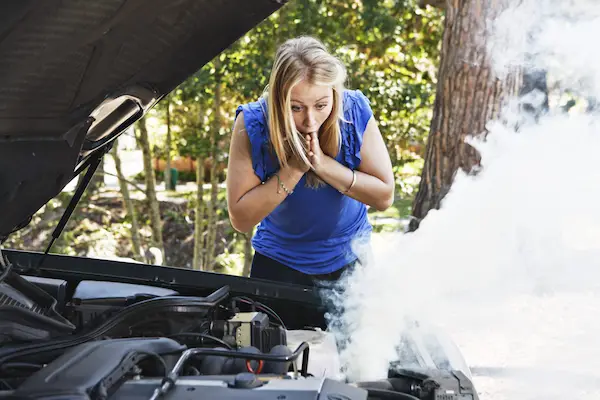
Above were some of the reasons for a car’s overheating when in working condition. But, what about car overheating when idle?
If your car is overheating when idle takes place, one of these three likely reasons for engine overheating could be to blame. Whatever is potentially causing your vehicle to get hot and bothered, you’ll need to have an experienced team to help you fix it before it destroys the engine.
The Engine Requires A Coolant Flush
Coolant (also known as antifreeze) flows through the engine to keep it cool by attempting to draw heat away from the engine’s hottest moving parts. This aids in keeping the engine at its optimal operating temperature.
Over time, the cooling system will pick up small particles such as rust and corrosion, requiring the system to be flushed and new coolant added. Too many particles in the coolant can degrade cooling performance.
It may even cause your engine to overheat while stopped at a light or in a drive-through row.
Malfunctioned Thermostat
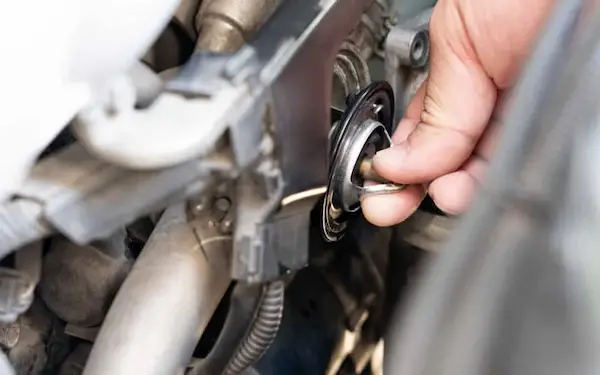
A cooling system assists in keeping the car cool, but it does need to warm up a little to obtain optimum performance and efficiency.
Before you even start your car and the engine is cooler, a small component known as a thermostat closes, preventing coolant from flowing throughout the entire system. When the engine attains its ideal temperature, the thermostat opens, allowing coolant to flow and the engine to remain at that temperature.
The thermostat could become stuck closed or only partially open, causing the cooling organizations to run poorly. While the car is moving, there may be adequate cooling, but once the engine is interrupted, the engine may become overheated. You’ll want to install a new thermostat that closes and opens consistently.
Radiator Fans That Aren’t Working
Remember that airflow over the radiator is indeed what cools the coolant, allowing it to be redistributed back to the engine as well as drawing away more heat. This cycle is ongoing as you drive, but if you’re stopped at a stoplight or moving slowly in bumper-to-bumper traffic, there isn’t sufficient forward motion to force air movement across the radiator.
This is where radiator fans enter. When the vehicle is idle or slowly moving, such fans push air over the radiator, ensuring that the system continues to function properly even though the vehicle is stopped.
However, if they stop working since the fan motor has combusted out, an electric short has already turned off the power to the fans, or debris has become lodged in the fan on its own, your engine may begin to overheat!
Once you start to drive, the movement of your car presses air over the radiator, lowering the combustion temperature.
How To Fix Overheating Car
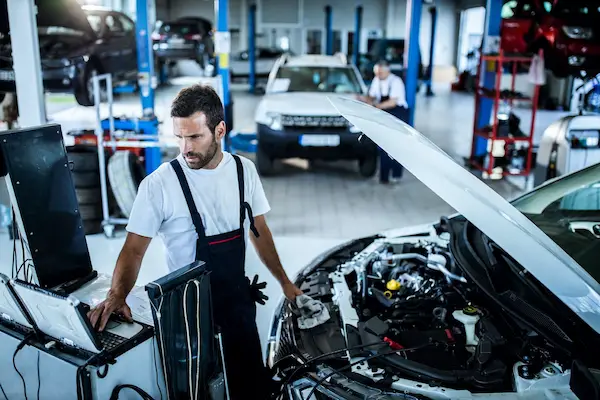
We discussed some of the reasons for car overheating above, in both idle and driving situations; now, we will discuss how to fix an overheating car.
- Turn off the AC immediately.
Switch off the AC immediately to reduce engine stress. Then, increase the heat to its maximum. This can assist in removing the heat from the engine and prevent it from overheating unless you can get into a secure location. You might get hot, but just a few moments of unpleasantness is a cheap price to pay, particularly in comparison to extreme engine maintenance.
- Look for a safe and secure place to pull over.
Pull over and turn off the engine. Allow at least 15 to 20 minutes for the engine to cool. Constantly check the temperature gauge; it should return to normal as the engine cools. While you’re waiting (and keeping an eye on the gauge), devise a schedule to get your superheated engine checked out. Make a phone call to an acquaintance, a friend, or your local roadside assistance.
- Check and add the coolant.
If the levels of coolant have dropped, a quick top-off can help shield your engine and keep it from overheating till you can get it repaired. This step, however, will be ineffective if a coolant pipe is blocked up or the origin of your problems is a ruptured radiator fan as well as the water pump.
Now that you know how to fix overheating car, let’s go over some prevention tips.
Tips To Prevent Car From Overheating
There may be various reasons for car overheating, but you must keep these tips in mind to avoid a big disaster:
- Look over the vehicle’s coolant proportion regularly.
- Keep an additional bottle of antifreeze and a liter of water in your car’s trunk.
- Keep an eye on the car’s thermostat while you are driving.
- Avoid overusing the car’s air conditioning system on extremely hot summer days.
- Help the engine cool down when you first notice it’s overheating.
The easiest way to determine why your car is overheating is to eliminate one by one all the reasons for car overheating to see which one is causing the problem.


